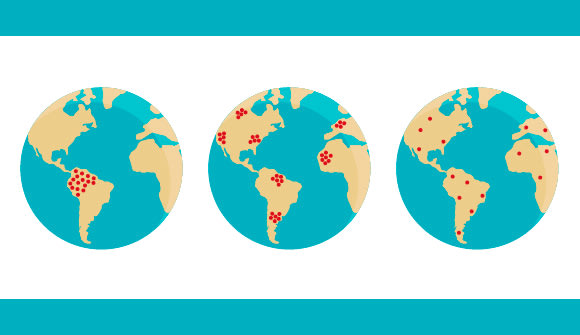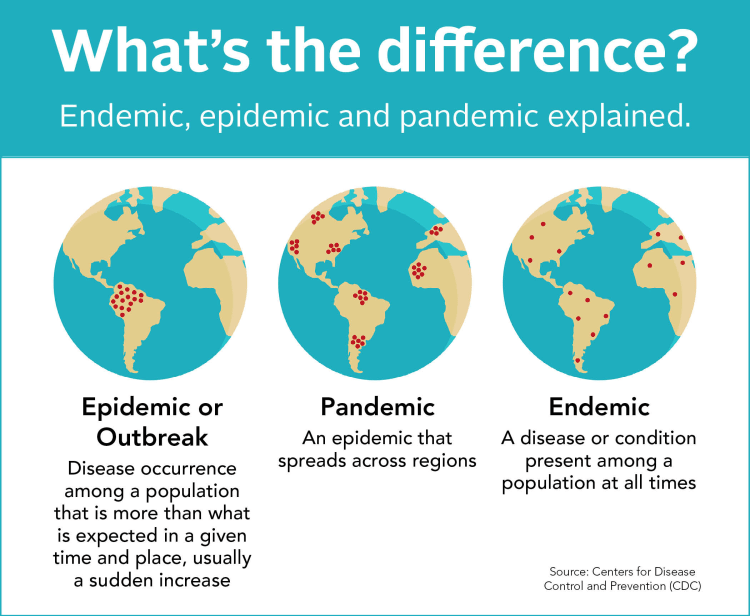Epidemiology 101
Endemics, pandemics and epidemics, explained.

On March 11, 2020, the World Health Organization (WHO) declared COVID-19 a pandemic as the disease spread rapidly around the world.
According to the Centers for Disease Control and Prevention (CDC), a pandemic refers to “an epidemic that has spread over several countries or continents, usually affecting a large number of people.”
So, what’s an epidemic? An epidemic refers to an increase (often sudden) in the number of cases of a disease above what is normally expected in a population. You can also think of the word “outbreak” as being similar to an epidemic, but "outbreak" is typically used when the disease is in a limited geographical area.
An end in sight?
An endemic is a disease that belongs to a particular people or country. The word comes from the Greek word endemos, meaning “in the population.” Endemics are a constant, predictable or expected presence in a specific location.
“COVID-19 will not be eradicated. It will not disappear. The optimistic view is that enough people will have immune protection from vaccination and natural infection that the disease will become endemic,” said Shalika Katugaha, MD, system medical director of infectious diseases at Baptist Health. “The virus will continue to circulate, but there will be less transmission and less COVID-19-related hospitalization and death.”
Right now, the United States is in the later stages of the pandemic: deceleration and preparation for future waves.
“The hope is that COVID-19’s endemic period will look different than the pandemic of the last two years. In the worst-case scenario, the endemic will look similar to what we have been dealing with in terms of hospitalizations and deaths,” explained Dr. Katugaha. “Endemic disease can be mild or severe. Epidemiologists are in the process of discerning where COVID-19 will fall in this spectrum of possibilities.”
Dr. Katugaha added, “Endemics are not harmless or normal. Epidemiologists watch them carefully because an endemic disease can become epidemic again.”

Around the world
The pandemic will be considered over when an expert committee of the WHO decides the virus is no longer an emergency of international concern. This will correspond with a sustained reduction in cases over time. Once the pandemic is over, in some countries, COVID-19 will be constant (endemic) or have sudden increases (epidemic).
“We must address disease disparities now so they don't amplify over time. Worldwide, vaccines and treatments are unequally distributed. Systems to manage COVID-19 must be collaborative and all-inclusive,” said Dr. Katugaha.
So, what’s next?
“In the United States and in Florida, we can shift focus from emergency response to recovery and preparedness for the possibility of a future COVID-19 surge due to new variants and waning immunity,” said Dr. Katugaha.
COVID-19 cases and hospitalizations are rising again in the United States, seemingly due to a subvariant called Omicron BA.2. According to Dr. Katugaha, cases will likely increase in the fall.
“It’s important to make sure hospitalizations and deaths don’t increase, and that we get through these waves without significant health, social and economic disruptions. The hope is to get into an endemic phase this year,” she explained. “We will not return to pre-2020 life. The COVID-19 pandemic has had wide-ranging effects that will last for decades. Health impacts include decreased life expectancy and ongoing symptoms due to long COVID-19. Worldwide, the numbers of people in extreme poverty and who are undernourished have increased by hundreds of millions.
“The focus of managing COVID-19 as endemic is control. We must learn to live with this disease, which means using control measures like vaccinations, testing and treatments to keep rates low. The scientific community, with the support of governments, must continue to update vaccines, diagnostics and therapeutics as new research and variants emerge. Control means to constantly stay alert and ready. If you’ve not gotten your vaccine or booster, now is the time.”
At Baptist Health, we want to help keep our community informed about COVID-19. For more information about COVID-19 vaccines, visit baptistjax.com/covid19vaccine. Click here to find a vaccination location near you.



